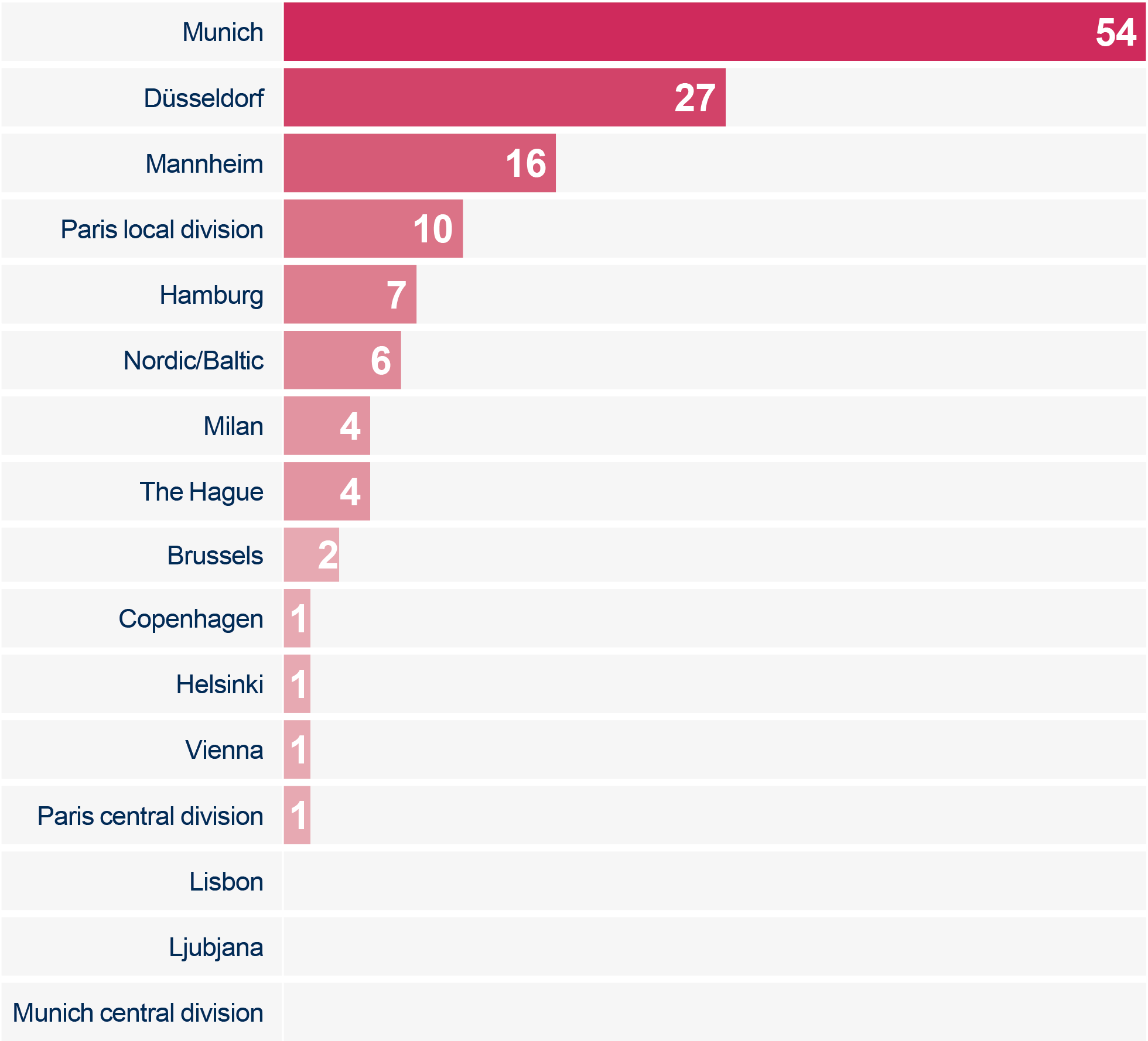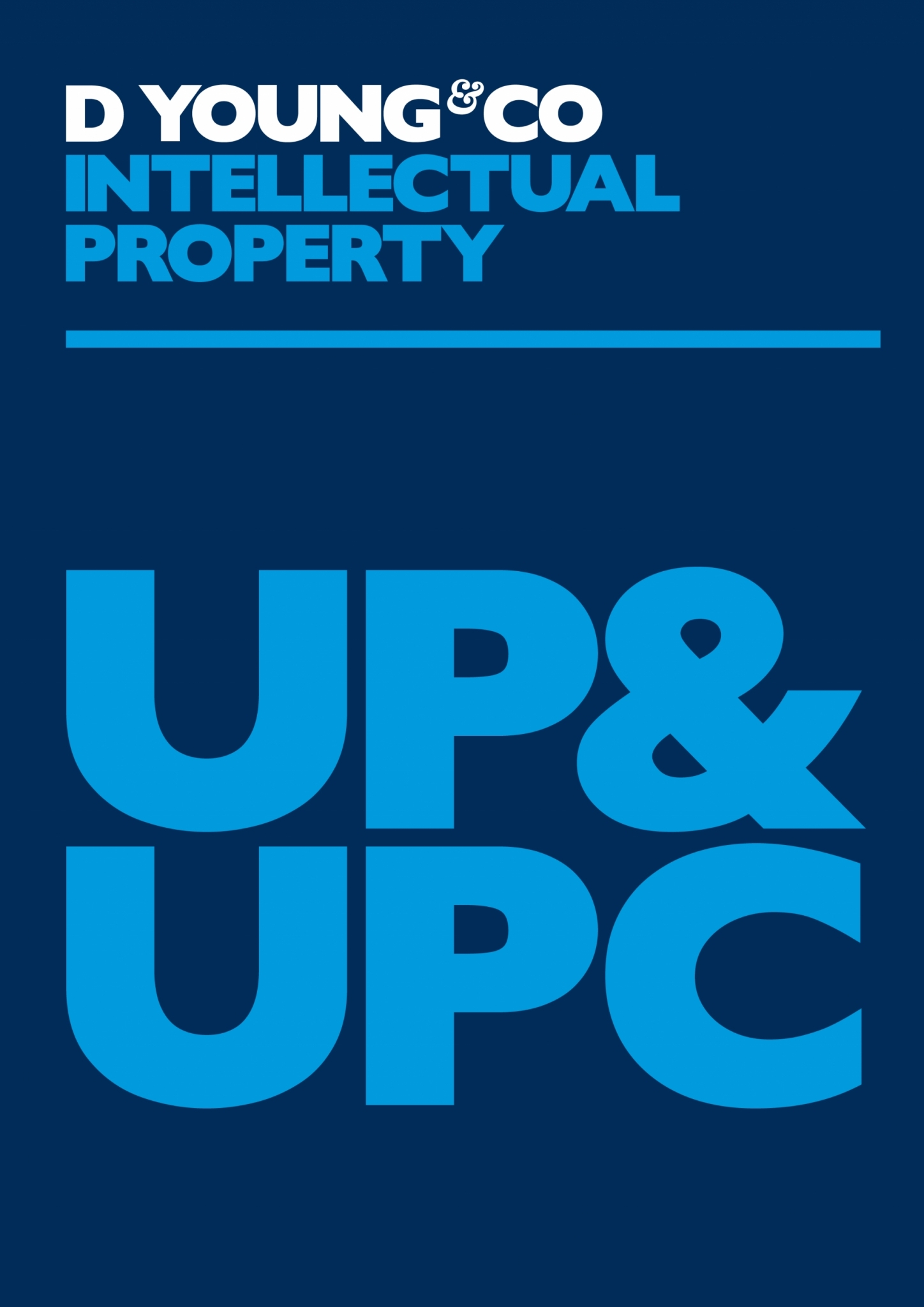Caseload insights: trends from the UPC’s first year
The UPC continues to publish monthly reports on the caseload of the courts, providing a valuable insight into the activity of the UPC divisions. A year into proceedings before the UPC, we take the opportunity to review the statistics concerning cases lodged at the UPC to analyse any trends or insights showing the story so far of how the UPC is being utilised.
Infringement: courts of first instance
According to the report, a total of 373 cases had been filed before the UPC first instance courts within the first twelve month period, with 133 infringement actions before the local divisions and a combined 204 revocation actions before all divisions of the UPC (including both direct revocation actions and counterclaims for revocation brought during infringement proceedings).
So far, the German-based local divisions have proven to be the most popular venues for infringement proceedings, with more than 75% of the total infringement cases being lodged at a German local division. The Munich local division is the most popular by far, followed by Düsseldorf, Mannheim and Hamburg. The Paris local division and the Nordic/Baltic regional division also appear to be popular with litigants.
Defendants in infringement proceedings have filed 165 individual counterclaims for revocation at the UPC, representing the vast majority of total revocation actions. However, it should be noted that these counterclaims have been filed in relation to only 63 individual infringement actions, generating an inflated impression of the revocation actions being initiated at the UPC. This is largely due to separate defendants in multi-party infringement actions bringing separate counterclaims.
There is a clear trend that local and regional divisions are preferred venues for bringing infringement actions. This is perhaps not surprising, given that Article 33 of the UPC Agreement broadly stipulates that infringement actions should be brought before the relevant local and regional divisions where infringement has occurred, or the defendant has their residence or place of business. However, it is noteworthy that only a single infringement action has been initiated before any central division (Paris).
Standalone revocation actions are few in number, relative to the counterclaim actions. The majority of these were filed within the first three months of the UPC launching, with most relating to “human necessities” matter (patents classified under the World Intellectual Property Organization (WIPO) international patent classification (IPC) section A). These cases will of course be heard at the Milan central division when it is scheduled to open its doors on 26 June 2024.
Before the UPC launched in 2023 there was extensive commentary concerning the potential for bifurcated hearings to occur before the UPC divisions. According to the jurisdictional provisions in the UPC Agreement and Rules of Procedure an infringement claimant has initial control over the jurisdiction of the proceedings. However, the local or regional divisions hearing infringement actions have, at their discretion, the authority to refer a revocation counterclaim or indeed the whole case to the central division under certain circumstances.
In practice, bifurcated hearings have not materialised in significant number. To the contrary, it appears that local and regional divisions have generally sought joint hearings of the infringement action and the counterclaim, broadly for the reasons of procedural expediency and uniform interpretation of the patent by the same judicial panel (for example, Plant e-Knowledge v Arkyne Technologies: UPC_CFI_239/2023). Nevertheless, there have been some multi-party cases where bifurcation is being implemented, seemingly to the advantage of the revocation claimant, in that the venues for the revocation actions have or are being shifted to the central divisions, potentially favouring the revocation claimant, while the infringement actions are being heard by the local divisions (such as Amgen v Sanofi-Aventis & Regeneron or Meril v Edwards Lifesciences).
Since the commencement of the UPC, the local divisions have received 32 cases relating to provisional and protective measures, including applications for preliminary injunctions, preserving evidence and orders for inspection. A single case has also been filed at the Hamburg local division for determination of damages, while a declaration of non-infringement has also been filed before the Paris central division and the Munich local division separately.
In view of the case load data published by the UPC, it is clear the central divisions are generally being utilised for the sole purpose of revocation proceedings, the only exception being that one infringement action and one declaration of non-infringement have been initiated before the Paris central division.
It is striking that 88% of the cases filed at the UPC are being heard before the local and regional divisions. Germany has hosting the majority of these divisions. In a reassuring move to support the growth in cases before the local and regional divisions the UPC has recruited additional legally qualified judges to the Munich and Mannheim local divisions. It should be expected that further judges will be recruited to the local and regional divisions as the caseloads increase. The central divisions by comparison are hearing relatively fewer cases (12% of the total first instance court case load). It will be interesting to see whether the proportion of cases heard by the central division changes, as the Milan central division opens and litigation strategies before the UPC develop.
UPC infringement actions (as of 30 May 2024)

Court of Appeal
The UPC Court of Appeal has received 16 appeals by adversely affected parties (under Rule 220.1 of the UPC Rules of Procedure) and 47 appeals against other orders (under Rule 220.2 of the UPC Rules of Procedure). The Court of Appeal has also received two requests for discretionary review, five applications for suspensive effect and 15 applications for an order for expedition of an appeal. A single application for rehearing has also been made (under Rule 245 of the UPC Rules of Procedure).
We are still at an early stage with respect to appeal proceedings before the UPC. Indeed, a large proportion of appeals under Rule 220.2 of the Rules of Procedure relate to a small number of multi-party proceedings, which inflate the headline figure. However, we note that a number of requests have been lodged for expediting the appeal procedure, most of which have seemingly been rejected on the basis that those requests are contrary to the principles of proportionality, fairness and equity to all parties to proceedings (see, for example, Guangdong OPPO Mobile Telecommunications Corp Ltd, OROPE Germany GmbH v Panasonic Holdings Corporation: UPC_CoA_472/2023).
Language of proceedings
Given the popularity of the German-based divisions before the UPC, it is interesting to note that English is now the predominant language at the UPC Court of First Instance, representing 50% of proceedings. One reason for this is likely to be due to English being increasingly used as a language of proceedings before the German-based divisions of the UPC, as well as being the predominant language in the divisions outside of Germany. For more detailed information regarding languages at the UPC, please refer to our related article, published 06 June 2024: Language of proceedings: UPC Court of Appeal provides further clarity.
In future we may expect the proportion of cases heard in English to increase, given the current trajectory. It is also possible that Italian is used more frequently as the Milan central division opens in due course.
Robust growth marks UPC’s first year
It is pleasing to see that the first year of the UPC has seen a strong uptake, with the caseloads before the Court of First Instance and the Court of Appeal both growing at determined rate. The focus of the UPC’s case load has been in Germany, which is perhaps unsurprising given Germany’s market presence and the UPC’s infrastructure. However, the proportion of cases in other UPC jurisdictions is likely to grow as confidence in the UPC jurisprudence increases. It is also positive to see a varied cohort of litigants that are party to proceedings before the UPC. This implies that the UPC is already being seen as a cost-effective and effective venue for instigating infringement and validity actions.
Related link
UPC news release “The Unified Patent Court appoints new legally qualified judges”, 30 April 2024: dycip.com/upc-new-judges-apr2024
Case details at a glance
Decision level: The Hague Local Division
Case: UPC_CFI_239/2023
Order/decision: ORD_581189/2023
Parties: Plant-e Knowledge BV, Plant-e BV v Arkyne Technologies SL
Date: 18 October 2023
Decision: dycip.com/plant-e-arkyne
Decision level: Munich Local Division
Case: UPC_CFI_14/2023
Order/decision: ORD_392/2024
Parties: Amgen Inc v Sanofi-Aventis (Deutschland GmbH & Groupe SA), Sanofi Winthrop Industrie SA, Regeneron Pharmaceuticals Inc
Date: 02 February 2024
Decision: dycip.com/amgen-sanofi-regeneron
Decision level: Court of Appeal, Luxembourg
Case: UPC_CFI_255/2023
Order/decision: ORD_7184/2024
Parties: Meril Italy srl v Edwards Lifesciences Corporation
Date: 27 February 2024
Decision: dycip.com/meril-edwards-lifesciences
Decision level: Court of Appeal, Luxembourg
Case: UPC_CoA_472/2023
Parties: Guangdong OPPO Mobile Telecommunications Corp Ltd, OROPE Germany GmbH v
Panasonic Holdings Corporation
Date: 18 December 2023
Decision: dycip.com/quangdong-panasonic

